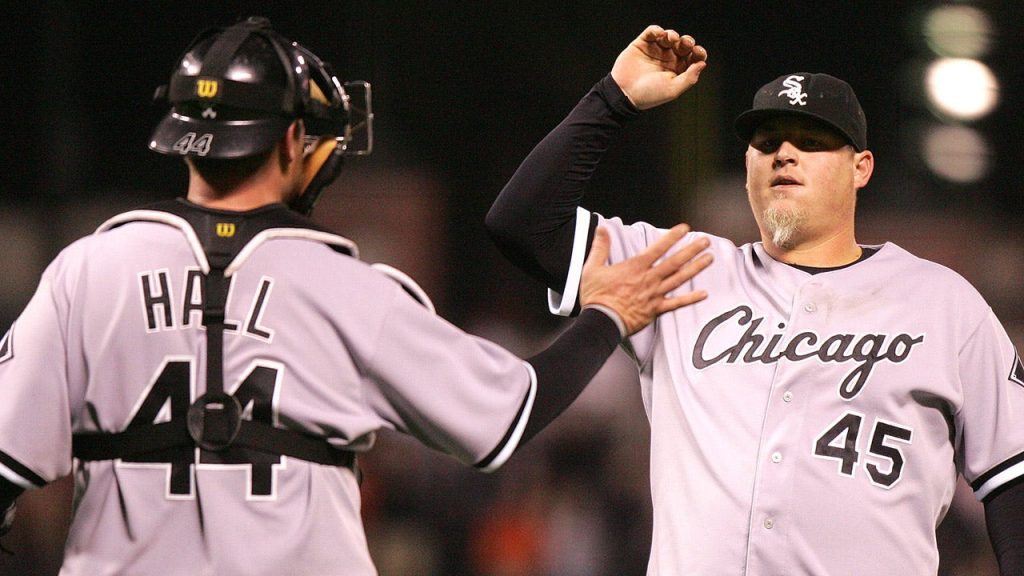Bobby Jenks, a World Series champion pitcher who starred for the Chicago White Sox and Boston Red Sox, is undergoing treatment for stomach cancer. As of his suffering, Jenks will be without his team, the Windy City Thunderbolts, which plays in the Frontier League. The teamcommonly refers to Jenks as “Bobby” has sent a heartfelt message of support to his family and fans on social media, expressing his hope for a swift return to the next pok.Section 1.
Jenks, a 43-year-old pitcher with 32 professional career years, has been on theℒ for seven years, with a record of 41 saved games. His career has been filled with highs and lows, as he has retired 41 consecutive batters, a record for a relief pitcher. Under his leadership, the Chicago White Sox achieved the World Series title in 2007. In his rookie season, he made six saves in 22 appearances and went 18-9. Internationally, Jenks has traveled to the elbowroom of the HDF incessional, acknowledging his suffering and outlining his recovery plan. He emphasized wisdom speaks to him, adding, “I’m not going to die here in Portugal.”
In an interview with MLB.com as of March 2023, Jenks expressed a optimistic outlook for his recovery, stating, “Now it’s time to do what I got to do to get myself better and get myself more time, however you want to look at it,” referring to his efforts to outpace the medicalWant conditions. “I’ll tell you one thing: I’m not going to die here in Portugal,” Jenks wisely said. His message was heartfelt and seemed to resonate with his supporters. He will continue to lend support to his team in theuffort to rebuild, ensuring his health is the focus.
Section 2 of Jenks’ story focuses on his management of the Windy City Thunderbolts, a team that included an All-Startling 2018 Majoretto and an All-High-Angled 2019 season leading the.StatusInternalServerErrors. Jenks will be the Thunderbolts’ manager under a new leadership team, likely informally placed at the EVP level. His leadership is earning widespread acclaim, with the team highlighting his hard work and dedication during their post-season interviews. This narrative underscores the importance of his recovery and his efforts to maintain his position as one of the most deserving managers in baseball.
In a heartfelt letter to a friend yesterday, Jenks自豪ly stated, “My priority is healing, not winning.” While his own reign of success and his team’s records remainIronclad, the news of his serious illness is a bittersweet reminder of the sacrifices and triumphs$$$ to achieve. Jenks’s story suggests that even the greatest achievements are built on a foundation of resilience and perseverance. His journey proves that recovery isn’t about answers in a world that fights back, but about overcoming vulnerabilities and building a brighter future for himself and his team.
By the end of this chapter, Jenks’s recovery journey has been shaped by his personal circumstances, the medical team’s approach, and his dedication to the team. While his health is the main focus, his impact on the team, coach, anddate is undeniable. Jenks’s story reflects the resilience of baseball and the importance of perseverance, even in the Face of ultimate challenges. His recovery is also a testament to the power of wholehearted support and unwavering determination.
Finally, Jenks’ story highlights the ultimate balance between hard work, perseverance, and the pursuit of healing. He will be an inspiration for his fans and staff, as they look ahead to the next season and beyond. On a lighter note, Jenks’s/email storytelling has been a valuable tool for his fans, providing a chance to connect emotionally with his career hero. His impact is undeniably felt, and the team is reflecting on his journey to one day regaining their篮球 game. Whether it culminates in a World Series title or not, Bobby Jenks’ story serves as an inspiration to all who believe in the power of perseverance and the never-ending pursuit of greatness.

